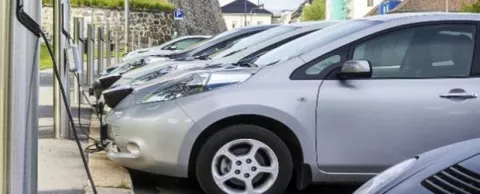
The markets for electric vehicles and charging networks are growing. Council Lead Partner Daimler is expected to spend almost $8 billion over the next two years to ensure that all of its models have an electric powertrain option and many car makers are routinely adding electrics to their model lines -- and working on self-driving car technologies. In addition, the market for electric car charging systems is forecast to grow at a CAGR of almost 30% in the next six years. The news that Council Associate Partner Black & Veatch has partnered with a leading EV charging network company to expand its operations is yet another indicator.
As cities develop and implement their smart city transformations, many are rightly focusing on transportation as a key component—and on EVs because they can contribute to reduced carbon emissions which in turn contributes to livability and sustainability. As you read our story, ask yourself if your city is ready for what looks more and more like the future of transportation. -- Doug Peeples
Black & Veatch has partnered with Volta, an established provider of free sponsored EV charging, to expand Volta's network to meet growing demand and the need for effective, sustainable and scalable smart transportation infrastructure.
"More and more cities are accelerating their plans surrounding electrification of transportation to achieve their environmental goals, enhance quality of life and capture real economic benefits," said Paul Stith, solution lead for Black & Veatch's Smart Integrated Infrastructure (SII) business.
The company is no stranger to EV infrastructure. Its charging infrastructure business has more than 163 megawatts of capacity in North America and it also is contributing in the completion of what is said to be the world's largest contiguous DC Fast Charging network.
Volta plans to add 600 more free public charging stations in conveniently located high traffic areas to encourage their use and support EV adoption. Volta provides charging that is free to the public and the businesses where the stations are installed. Sponsors pay for the stations and use them to advertise their products and services.
As the company conducting the project, Black & Veatch brings its experience with intelligent infrastructure capable of communications and data analytics to track network operations.
IBM's Watson in a self-driving bus
Olli, a 12-passenger autonomous electric bus, is now serving passengers in Washington, DC and will soon be on the roads in Miami-Dade County and Las Vegas. The self-driving bus features a variety of advanced technology, and is the first self-driving vehicle to incorporate the cognitive computing capabilities of Council Lead Partner IBM's Watson Internet of Things capabilities.
The bus is the creation of technology integrator Local Motors and is the company's first step into the self-driving vehicle market. The bus is equipped with more than 30 sensors that provide transportation data Watson analyzes and learns from. Watson also allows passengers to converse with Olli. They can ask questions about how it works, request a drop off and more. IBM's involvement in the Olli project underscores the company's thinking about the future of transportation. Harriet Green, general manager for IBM Watson Internet of Things, described the company's participation as an opportunity for "...exploring the art of what's possible in a world of self-driving vehicles and providing a unique, personalized experience for every passenger while helping to revolutionize the future of transportation for years to come."
Will people want self-driving cars?
A U. of Michigan study found that almost 44% of people surveyed didn't any automation in their next car, while others wanted some. Generally, the study found that most participants wanted to be able to control their vehicle. The study also indicated that older adults were most hesitant about the technology. But 40% of the participants in the 25-34 age range and 34.4% in the 35-44 age range said they were interested in self-driving vehicles. The reluctance to embrace new technologies isn't unusual. But as the numbers make clear, the percentage of survey participants who are interested in autonomous cars seems surprisingly high considering the technology is relatively new and the cars aren't yet available.
For more on smart transportation...
To learn more about smart transportation systems, how they work and why they can give your city a competitive advantage, click to the Transportation chapter of the Smart Cities Readiness Guide. You can also read case studies on what several cities have done to solve transportation-related problems.
Doug Peeples is a Portland, Oregon-based writer specializing in technology and energy. Follow @smartccouncil on Twitter.



